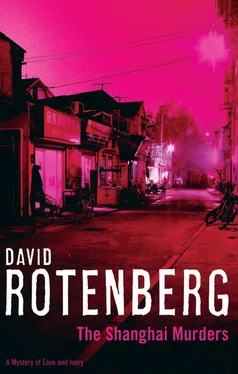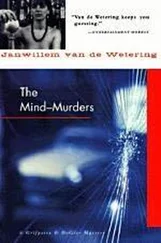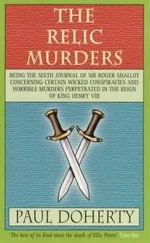David Rotenberg - The Shanghai Murders
Здесь есть возможность читать онлайн «David Rotenberg - The Shanghai Murders» весь текст электронной книги совершенно бесплатно (целиком полную версию без сокращений). В некоторых случаях можно слушать аудио, скачать через торрент в формате fb2 и присутствует краткое содержание. Год выпуска: 2011, Издательство: Schwartz Publishing Pty. Ltd, Жанр: Полицейский детектив, на английском языке. Описание произведения, (предисловие) а так же отзывы посетителей доступны на портале библиотеки ЛибКат.
- Название:The Shanghai Murders
- Автор:
- Издательство:Schwartz Publishing Pty. Ltd
- Жанр:
- Год:2011
- ISBN:нет данных
- Рейтинг книги:5 / 5. Голосов: 1
-
Избранное:Добавить в избранное
- Отзывы:
-
Ваша оценка:
- 100
- 1
- 2
- 3
- 4
- 5
The Shanghai Murders: краткое содержание, описание и аннотация
Предлагаем к чтению аннотацию, описание, краткое содержание или предисловие (зависит от того, что написал сам автор книги «The Shanghai Murders»). Если вы не нашли необходимую информацию о книге — напишите в комментариях, мы постараемся отыскать её.
The Shanghai Murders — читать онлайн бесплатно полную книгу (весь текст) целиком
Ниже представлен текст книги, разбитый по страницам. Система сохранения места последней прочитанной страницы, позволяет с удобством читать онлайн бесплатно книгу «The Shanghai Murders», без необходимости каждый раз заново искать на чём Вы остановились. Поставьте закладку, и сможете в любой момент перейти на страницу, на которой закончили чтение.
Интервал:
Закладка:
Wang Jun’s people had still not been able to locate the street sweeper so Fong assigned two more people to help in the search and then dismissed the meeting except for Lily, Wang Jun, and the old coroner. Fong’s assistant tried to stay behind but Fong sent him out and locked the door behind him.
“That may not be so smart,” Wang Jun said.
“I never claimed to be smart, Wang Jun.”
“I know that, but try not to be stupid. He’s probably on his way to the commissioner’s office now.”
“That’ll give us ten minutes.”
After a moment of silence, Lily said, “For what?”
Fong moved toward the time line. As he passed the picture, a copy of the one he had in his desk, he noted that no one had yet mentioned the blob of heart between Richard Fallon’s legs or the fingers of Richard Fallon’s right hand that were pointing-pointing to what? At the time line he stopped and looked at them. Then he took out a copy of the Shanghai Daily News from that first morning with the headline DIM SUM KILLER STRIKES IN JULU LU ALLEY. “We’ve got a problem.” Pointing at the time chart, “The body was found at 10:43 by rookie cop Ling Che. The CSU arrived at 10:52. Right?”
“To the point, Fong, time’s a-wastin’ here,” chimed in Wang Jun.
“Were there any reporters at the scene? Do you remember when the first reporters showed up?”
Lily and Wang Jun were now interested. “Yeah, I remember, because I was surprised how long it took them to smell this one out. I don’t think there was one there before the body was already photographed. So not before midnight, at the earliest.”
“Right,” said Fong. Then turning to the coroner, “And what time did I get to the Hua Shan Hospital morgue?”
The coroner flipped through his pad but Fong interrupted him. “It was 12:49, trust me. And I didn’t come up with the Dim Sum crack until at least one o’clock.”
The coroner was lost. “So?”
But it was Lily who was on top of it. “Throw me that paper.”
Fong did. Lily looked carefully at the masthead. “This is the early edition,” said Lily.
Fong nodded. “Right.”
The coroner still didn’t get it. “So?”
Wang Jun let out a lungful of smoke that seemed to jet across the room. “So? So, the early edition goes to press before midnight. The reporters didn’t arrive until after midnight. Even with cellular phones they couldn’t possibly have filed the story in time to make this paper.”
Then Fong played his trump card. “It’s not just a matter of being in time to file their story. They have to clear stories, especially stories about foreigners, with the authorities. I needn’t remind you that China does not exactly have a free press.”
With a look of shock, Lily said, “Are you trying to say that the paper had this story before Richard Fallon was killed?”
“The story and the clearance for the story,” nodded Fong.
After a moment, while this was sinking in, the coroner added, “I guess they just got lucky with the dim sum stuff.”
At that there was a knocking on the door that quickly became a pounding. Fong opened the door to a very angry Commissioner Hu and a smiling Shrug and Knock.
Fong sat in the back of the campus’s rickety old theatre that night. His chair squeaked. Every chair in the ancient place squeaked, every floorboard moaned, and the archaic electrical fixtures, which would have closed down most other public establishments, hummed loudly. The large black overhead fans rotated at different speeds (two did not rotate at all) and the sound of the air exhaust system alternated between deafening and concussive. The place smelled of people. Fong liked it. It had been Fu Tsong’s favourite theatre and she had played in theatres all over China as well as in Southeast Asia and Japan. In fact she had fought the new thousand-seat theatre on campus, first against the building and then against the design. But it was always hard to convince Chinese people to trust their own theatrical instincts when there were Russian consultants around. Russians used the name Stanislavski like a weapon.
“The proscenium’s too wide.” “Stanislavski loved a wide proscenium.”
“Chinese audiences need the floor of the stage lowered because the average height of Chinese people is less than that of Russians.” “Stanislavski always had his stages this height.”
“The dimension of this place is inhuman. Brutal.” “Stanislavski said the humanity should be on the stage, not in the house.” And so on.
So she had lost. Actually, the city of Shanghai had lost. A lot of money had been spent on a virtually useless theatrical space because a Russian acting teacher who had probably not said a third of the things Russians claim he said was too godlike to be challenged.
Fu Tsong assumed that Stanislavski was a nice enough guy with the odd good idea. She also assumed that he never intended to be quoted and deified. . . although being Russian it’s possible he was interested in deification. Be that as it may, Fu Tsong had found it a breath of fresh air when Geoffrey Hyland entered her theatrical life with the line: “Stanislavski who? If I had a dog, I might call him Stanislavski-if he were long dead and gone and irrelevant to the twentieth century art of acting, that is.” It had been artistic love at first sight.
Fong remembered Fu Tsong coming home after that first rehearsal with Geoffrey Hyland. He remembered her excitement, her joy. He also remembered his feeling of being outside her world. Outside while Geoffrey was inside.
Now, on the stage, Geoffrey spoke to the Twelfth Night cast who sat around old wooden tables. There was a rapt concentration so unlike most Chinese rehearsals, which were often exercises in wasted energy and diffused focus. Fong noted that the academics had been ushered out of the room. This session was not about text. Not even about Twelfth Night . This session, the first rehearsal in Geoffrey Hyland’s theatre land, was about his passion: acting. Fong had heard Fu Tsong talk about Geoffrey Hyland’s first rehearsals. She had said that she learned more about acting in two hours with Geoffrey Hyland than she had in four years at theatre school. So Fong leaned forward and tried to catch every word, to hear what she had heard.
Geoffrey was on his feet-“in full flight” was the phrase that came to Fong’s mind-his translator at his side. “For an actor the art form of the theatre is not theatre, but acting. Acting is the art. Because most actors are taught by directors they are usually taught that what actors do is interpret. That acting is not an art but a craft. It behooves a director to have a pliant, obedient actor. And the best way to achieve this is through convincing an actor that his job is to serve the text, the way a brick mason serves an architect. Bullshit! Bullshit, bullshit, bullshit, and more fucking bullshit.”
Geoffrey looked out into the house. For the briefest moment his eyes locked with Fong’s.
Geoffrey took a breath and allowed his interpreter to catch up. “Acting is not about pretending. Acting is about knowing your instrument and selecting the notes on that instrument that produce the ’most eloquent music.’ Hamlet, when pumped for information by Rosencrantz and Guildenstern, takes a recorder from his pocket and offers it to one of them saying, ’Will you play upon this pipe?’ To which Guildenstern responds, ’My lord I cannot.’ After further beseeching by Hamlet, Guildenstern finally says, ’I know no touch of it, my lord!’ To which Hamlet responds, ’Tis as easy as lying. Govern these ventages with your finger and thumb, give it breath with your mouth, and it will discourse most eloquent music.’ Then taking back the recorder he says, ’Why, look you now, how unworthy a thing you make of me. You would play upon me; you would seem to know my stops; you would pluck out the heart of my mystery; you would sound me from the lowest note to the top of my compass; and there is much music, excellent voice in this little organ, yet cannot you make it speak. ’Sblood, do you think I am easier to play on than a pipe?’ Like everything else in this play, Hamlet is talking about acting. What an actor does, as Hamlet says, is know his ventages and his stops and plays them in order to create most eloquent music. To do so is an art, not a craft.”
Читать дальшеИнтервал:
Закладка:
Похожие книги на «The Shanghai Murders»
Представляем Вашему вниманию похожие книги на «The Shanghai Murders» списком для выбора. Мы отобрали схожую по названию и смыслу литературу в надежде предоставить читателям больше вариантов отыскать новые, интересные, ещё непрочитанные произведения.
Обсуждение, отзывы о книге «The Shanghai Murders» и просто собственные мнения читателей. Оставьте ваши комментарии, напишите, что Вы думаете о произведении, его смысле или главных героях. Укажите что конкретно понравилось, а что нет, и почему Вы так считаете.












